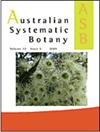基因组学时代的豆类研究进展
IF 1.6
3区 生物学
Q4 EVOLUTIONARY BIOLOGY
引用次数: 8
摘要
下一代测序(NGS)技术和应用使豆类生物学取得了许多关键进展,从标记发现到全基因组测序,并将为未来的豆类研究提供许多新途径。特别是在过去的6年里,由于高通量测序的使用,豆类科学取得了革命性的进展,包括开发了许多类型的标记和数据,这些标记和数据可用于物种水平以上和以下的进化研究,从而解决了以前无法实现的关系。反过来,这种解决方案为假设检验和推断提供了机会,以提高我们对豆类生物多样性以及创造地球上最多样化植物家族之一的模式和过程的理解。此外,在基因组学时代,我们对豆类生态学的理解取得了重大进展,包括它们在全球生态系统中作为氮固定剂的作用。通过NGS平台以测序基因组和基因表达谱的形式积累遗传和基因组数据也极大地影响了植物育种和保护工作。在这里,我们从进化、生态学以及遗传和基因组资源开发的角度总结了NGS方法在豆类生物学中获得的知识。本文章由计算机程序翻译,如有差异,请以英文原文为准。
Advances in legume research in the genomics era
Next-generation sequencing (NGS) technologies and applications have enabled numerous critical advances in legume biology, from marker discovery to whole-genome sequencing, and will provide many new avenues for legume research in the future. The past 6 years in particular have seen revolutionary advances in legume science because of the use of high-throughput sequencing, including the development of numerous types of markers and data useful for evolutionary studies above and below the species level that have enabled resolution of relationships that were previously unattainable. Such resolution, in turn, affords opportunities for hypothesis testing and inference to improve our understanding of legume biodiversity and the patterns and processes that have created one of the most diverse plant families on earth. In addition, the genomics era has seen significant advances in our understanding of the ecology of legumes, including their role as nitrogen fixers in global ecosystems. The accumulation of genetic and genomic data in the form of sequenced genomes and gene-expression profiles made possible through NGS platforms has also vastly affected plant-breeding and conservation efforts. Here, we summarise the knowledge gains enabled by NGS methods in legume biology from the perspectives of evolution, ecology, and development of genetic and genomic resources.
求助全文
通过发布文献求助,成功后即可免费获取论文全文。
去求助
来源期刊

Australian Systematic Botany
生物-进化生物学
CiteScore
3.10
自引率
12.50%
发文量
12
审稿时长
>12 weeks
期刊介绍:
Australian Systematic Botany is an international journal devoted to the systematics, taxonomy, and related aspects of biogeography and evolution of all algae, fungi and plants, including fossils. Descriptive taxonomic papers should normally constitute a comprehensive treatment of a group. Short papers on individual species and nomenclatural papers must contain significant new information of broader interest to be considered. The prestigious L.A.S. Johnson Review Series is published. Other review articles will also be considered. All papers are peer reviewed.
Australian Systematic Botany is published with the endorsement of the Commonwealth Scientific and Industrial Research Organisation (CSIRO) and the Australian Academy of Science.
 求助内容:
求助内容: 应助结果提醒方式:
应助结果提醒方式:


